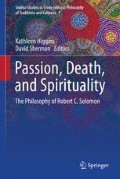Abstract
This chapter argues that focusing on the Hegelian strand of Solomon’s diverse legacy not only highlights his unique contributions to Hegel studies, but gives us a glimpse of the ongoing, indomitable spirit of Robert C. Solomon. Particular attention is given to his development of the claim that Hegel’s dialectic is not a method, but a metaphor in the mode of the Romantic poets’ notion of Bildung, which, in Solomon’s interpretation of Hegel, highlights an artful image (or “guise”) of Geist as an ongoing, growing, and intertwined human, lived experience that does not have to have an end, despite the anticipatory suggestiveness and seeming finality of the language of “Geist” as Absolute. Experiencing or being moved by the movement of this spirit is ‘getting’ (and getting into) the spirit of Hegel, and the spirit of Solomon, which doesn’t have to end for or with us.
This is Bob’s marvelous phrase. See Solomon (1983: 7).
Access this chapter
Tax calculation will be finalised at checkout
Purchases are for personal use only
Notes
- 1.
At the University of California Riverside in the late 1980s Bernd Magnus was my graduate advisor, and both Bob and Kathy were there and on my dissertation committee. It was a truly electric context for which I will always remain grateful.
- 2.
For me, Solomon is primarily and extraordinarily a historian of philosophy, although if he accepted this, perhaps he would have preferred ‘existentialist historian of philosophy’. It is, of course, arguable that Nietzsche or Sartre are more alive in wide span of Bob’s work than is Hegel, or that all of the giants of Western Philosophy, shine through at some point in Bob’s articulation of his philosophical commitments. The more I think about it, the more I am disinclined to say that one thread is more salient than the others, and that, at least, it may be impossible, for example, to separate the spirit of Hegel from the spirit of Nietzsche in the ‘Spirit of Solomon’, but it also strikes me that this may have more to do with my own intertwined allegiance to both Hegel and Nietzsche than it does to “discovering” this aspect of Bob’s indomitable and unique spirit. Bob once genially accused me of Hegelianizing Nietzsche and Nietzscheanizing Hegel, and over the years I have been inclined to think that this was (either) false, or that it was true and there just was connective resonance between Hegel and Nietzsche, or that mixing the two was just a product of reading them through the lens of Bob’s readings, which were always so much more than commentary, and were so infectious. But I am still trying to get beyond Bob’s suggestion that seeing them as too interwoven was a problem that I had, and perhaps in writing this I am trying to convince myself, as much as my audience, that via my reading of both Hegel and of Bob, I can identify something that connects all three. But again, it is primarily the Hegelian thread in Bob’s work that I am trying to tug on here.
- 3.
- 4.
I remember a story Bob told me in the 1980s about a conversation he had with Arthur Danto about philosophers marrying other philosophers—in which Danto ostensibly said it was all well and good to take philosophy personally, but you couldn’t live it, or in any case you couldn’t take it to bed, and Bob’s reply was that there was no way to go to bed without it.
References
Hegel, G.W.F. 1954. The history of philosophy. In The philosophy of Hegel, ed. Carl J. Friedrich. New York: Random House.
Solomon, Robert C. 1983. In the spirit of Hegel. New York: Oxford University Press.
Solomon, Robert C. 2002. Spirituality for the skeptic: The thoughtful love of life. Oxford: Oxford University Press.
Author information
Authors and Affiliations
Corresponding author
Editor information
Editors and Affiliations
Rights and permissions
Copyright information
© 2012 Springer Science+Business Media Dordrecht
About this chapter
Cite this chapter
Starrett, S.N. (2012). In the Spirit of Solomon: The ‘Guise of Geist’. In: Higgins, K., Sherman, D. (eds) Passion, Death, and Spirituality. Sophia Studies in Cross-cultural Philosophy of Traditions and Cultures, vol 1. Springer, Dordrecht. https://doi.org/10.1007/978-94-007-4650-3_15
Download citation
DOI: https://doi.org/10.1007/978-94-007-4650-3_15
Published:
Publisher Name: Springer, Dordrecht
Print ISBN: 978-94-007-4649-7
Online ISBN: 978-94-007-4650-3
eBook Packages: Humanities, Social Sciences and LawPhilosophy and Religion (R0)

